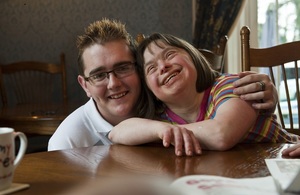Government seeks views to improve lives of people with Down's syndrome
Government launches call for evidence to ensure better access to health, education, social care and housing for people with Down’s syndrome.

- People with Down’s syndrome, families, professionals and charities are invited to share their experiences and expertise which will be used to shape new guidance
- Life expectancy has increased from 13 to almost 60 within a generation and services are needed to support the more than 40,000 people with Down’s syndrome and their families
People with Down’s syndrome, their families, professionals and charities are being invited to answer the government’s call for evidence to shape new guidance for authorities to follow.
The guidance will help to ensure those with Down’s syndrome receive the care and support they need to live longer, happier and healthier lives.
People with Down’s syndrome have seen their life expectancy increase from around 13 to almost 60 within a generation so tailored support is required to meet additional health, education, care and housing needs.
Minister for Care and Mental Health Gillian Keegan said:
I know with the right support people with Down’s syndrome can live full and independent lives.
We need to work together to help organisations better understand how to provide appropriate education, housing and the best possible health and social care support.
It is time for families to stop struggling alone and this guidance will help public authorities to put the right support in place.
The Down Syndrome Act, supported by the government and Dr Liam Fox MP, requires the Health and Social Care Secretary to issue guidance on how to meet the needs of people with Down’s syndrome.
Authorities including the NHS, health commissioners and integrated care boards – who will also appoint a named lead to oversee implementation – will then be required to follow the guidance.
People with Down’s syndrome are at an increased risk of certain medical conditions – such as congenital heart disease, early onset dementia or hearing and visual impairment. Education and early years support may not always meet needs and can be difficult to access and there is not enough suitable supported housing.
The new guidance will help ensure improved access to the support that people with Down’s syndrome need, which can include speech and language therapy, additional educational, housing and care support.
Although legal duties and care frameworks already exist, it can be difficult to access services. This guidance will identify what is needed and how it should be delivered.
The call for evidence will also investigate what support is available and what barriers remain with regards to accessing healthcare. In adult social care, questions will focus on the levels of support available to ensure personal care, community engagement and relationships can be maintained.
In housing everyone has the right to try and live as independently as they wish in their own home so questions will focus on what is needed to make this possible.
In education the call for evidence will link to the wider Special Education Needs and Disabilities (SEND) and alternative provision reforms.
Minister for School Standards, Will Quince said:
It’s crucial that our work to improve people’s opportunities in this country is based on people’s experiences.
I know through my conversations with parents, professionals and children with special educational needs and disabilities, including those with Down’s syndrome, how important guidance can be in helping services to improve people’s lives.
I encourage anyone with an interest to have their say in this call for evidence, to build on our work improving the SEND system for children and families across the country.
The call for evidence is focused on Down’s syndrome but will also test whether the guidance can benefit other people too. Those with a different genetic condition, as well as their families and carers, are invited to contribute.
This call for evidence will run for a period of 16 weeks and is open to everyone.